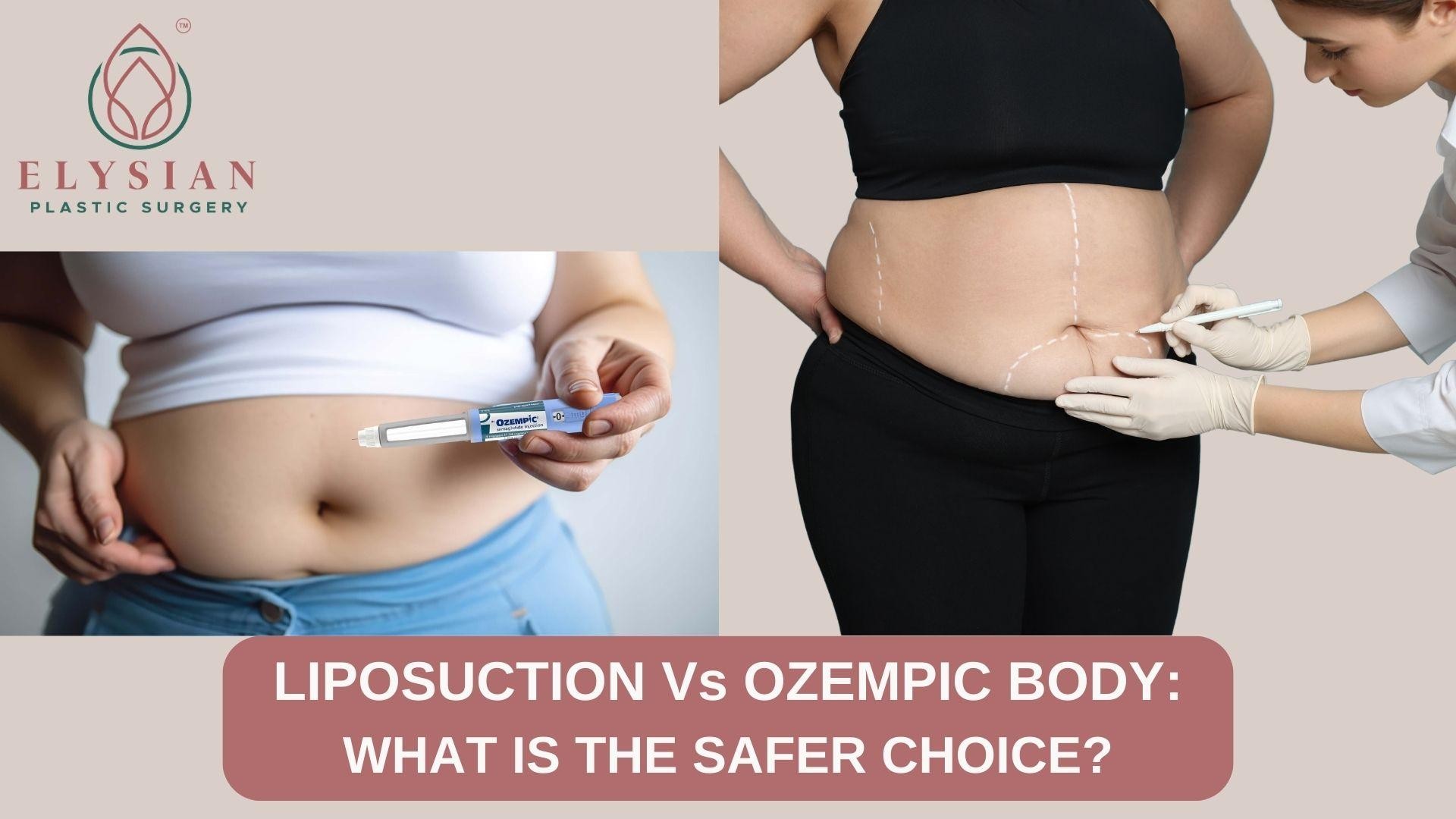Liposuction vs. Ozempic Body: What’s the Safer Choice?

In recent years, two very different paths to weight loss have been making headlines: liposuction and Ozempic. One is a surgical procedure that’s been around for decades. The other is a prescription drug originally meant for type 2 diabetes, now widely used for weight loss.
Both promise results. Both have risks. If you’re deciding between them, you should not only consider “what works” but also what’s safer for you.
In this blog post, our experts at Elysian Plastic Surgery Centre, being considered as the best plastic surgeons in Surat, will help break it down for you.
What is liposuction?
Liposuction is a cosmetic surgery that removes fat from specific parts of the body. Surgeons insert a thin tube (cannula) under the skin and suction out fat cells.
It’s most common on the abdomen, thighs, arms, and hips.
Liposuction isn’t a weight-loss method for people with obesity. It’s designed for shaping the body when diet and exercise haven’t worked for certain stubborn areas. You’ll usually see results right away, but swelling and bruising can last for weeks.
Risks of liposuction
Because it’s surgery, liposuction carries the usual risks:
● Infection
● Bleeding
● Blood clots
● Reaction to anesthesia
There are also specific risks like uneven fat removal, skin rippling, or nerve damage. That’s why you should look for experts with formidable experience of performing best liposuction surgeries in Surat, like Elysian Plastic Surgery Centre.
Recovery can take several weeks, and you’ll likely need time off work. Even though it’s considered safe when done by an experienced surgeon, it’s still an invasive procedure — your body needs to heal.
What is Ozempic?
Ozempic is a brand name for semaglutide, a medication first approved to help control blood sugar in people with type 2 diabetes.
It works by mimicking a hormone (GLP-1) that regulates appetite and slows digestion. Many people on Ozempic lose weight because they eat less and feel full longer.
While it’s not officially approved for weight loss in all countries, doctors often prescribe it “off-label” for that purpose. Wegovy, a higher-dose version of semaglutide, is approved specifically for weight loss.
Risks of Ozempic
Ozempic isn’t surgery, but it comes with its own set of risks:
● Nausea, vomiting, diarrhea, or constipation (common in early weeks)
● Possible gallbladder problems
● Risk of pancreatitis
● Rare thyroid tumors in animal studies (not yet proven in humans)
Another big issue: when people stop taking Ozempic, they often regain the weight. That means you may need to stay on it long-term, which can be expensive and may increase side effects over time.
Liposuction vs. Ozempic: How the results compare
Speed of results:
Liposuction gives immediate visible changes once swelling goes down. Ozempic works gradually — weight loss happens over months.
Sustainability:
With liposuction, if you gain weight later, the fat may return in other areas. With Ozempic, the weight can come back quickly if you stop taking it.
Lifestyle impact:
Liposuction requires downtime, a recovery period, and temporary activity limits. Ozempic doesn’t require recovery, but you’ll need regular injections and possibly ongoing prescriptions.
Cost:
Both can be expensive. Liposuction is usually a one-time cost, whereas Ozempic costs can add up over months or years.
Which is safer?
It depends on your health, goals, and tolerance for risk.
Liposuction may be safer if:
● You’re generally healthy and only want to target small areas of stubborn fat
● You understand it’s for body contouring, not overall weight loss
● You’re okay with surgery and the recovery period
Ozempic may be safer if:
● You need to lose a significant amount of weight for health reasons
● You want to avoid surgery
● Your doctor has reviewed your medical history and thinks it’s a good fit
Neither is risk-free. The “safer” choice is the one that matches your medical needs, lifestyle, and ability to maintain results. Ensure that, whichever option you go for, it is being treated by healthcare experts.
The middle ground: lifestyle first
Many doctors recommend trying diet changes, exercise, and behavioral strategies before turning to either option. Both liposuction and Ozempic can give results, but they work best when paired with healthier habits.
Surgery can shape your body, but it won’t stop future weight gain. Medication can control appetite, but it won’t replace nutrition and movement.
Bottom line
Liposuction and Ozempic take very different routes to the same goal — less body fat. One works in hours, the other in months. One reshapes, the other changes how your body regulates hunger.
If safety is your main concern, the answer isn’t one-size-fits-all. Talk to us at Elysian Plastic Surgery Centre, as we have some of the best plastic surgeons in Surat, who are board certified and experts in their field, they can guide you with their experience and expertise. Be clear about your goals, ask about every risk, and make sure you’re choosing for the right reasons.
Losing weight or shaping your body can be life-changing, but so can the side effects if you rush in without the full picture.
